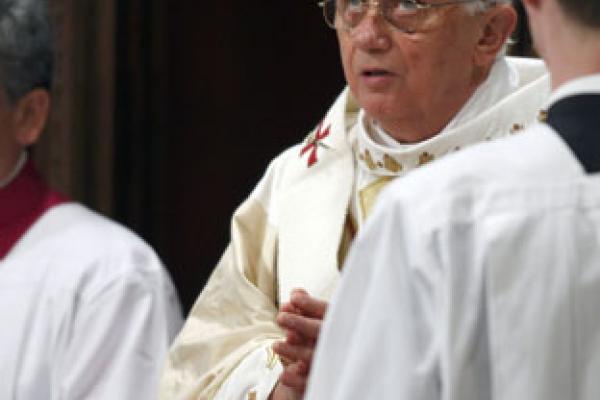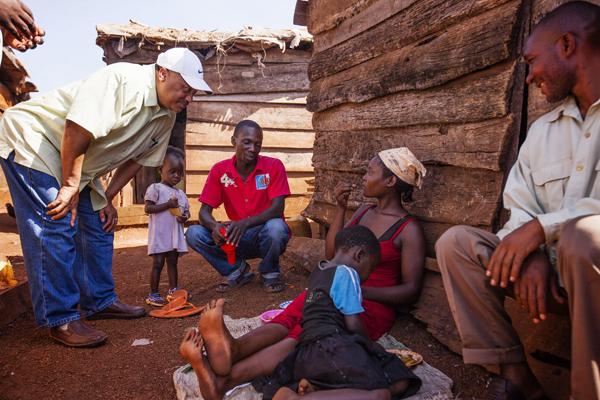VATICAN CITY — Just months after becoming the first pope in nearly 600 years to resign, reports are surfacing that Pope Emeritus Benedict XVI is in poor health with diminished stature and energy.
After a brief hiatus at the papal summer residence in Castel Gandolfo, Benedict returned to live in a converted monastery on the edge of the Vatican gardens last month. Already, some of his visitors have commented on the former pope’s physical deterioration.
“Benedict is in a very bad way,” said Paloma Gomez Borrero, a veteran Vatican correspondent for Spain’s Telecinco television network who visited the former pope in late May. “We won’t have him with us much longer.”
Cardinal Joachim Meisner, the archbishop of Cologne, Germany, and a personal friend of Benedict’s, visited the former pope in April.
“I was shocked at how thin he had become,” Meisner said at the time. “Mentally, he is quite fit, his old self. But he had halved in size.”
Fred Luter had a lot of firsts in the last year: first black president of the Southern Baptist Convention; first time chairing the denomination’s annual meeting, this week, in Houston; and recently, first-time missionary.
“It was inspirational, but also very humbling in a lot of instances, just to see how some people are living,” Luter said, days after returning from Ethiopia and Uganda.
Struck by the poor living without running water and by missionaries willing to “leave the comforts that we have here in America,” Luter wants more members ofhis New Orleans congregation — as well as more of the nation’s 16 million Southern Baptists — to take overseas missions seriously.
In particular, he wants more of his denomination’s relatively small black population to serve as missionaries.
Why would evangelical Christians want anything to do with public schools? Judging from decades of culture war rhetoric, these are bastions of secular humanism where God and his fearers are unwelcome. School prayers — not allowed. Teaching creationism — verboten. Abstinence-only sex education — few to be found. Sharing the gospel openly — forget about it.
Little wonder, then, that many evangelicals withhold their support, and kids. And through their support of conservative politicians and policies, evangelicals have been, broadly speaking, part of a political dynamic that has shrunk support, financial and otherwise, for public schools.
But there is a serious problem with this flight from public education. Evangelicals are realizing there are real human beings in those left-behind schools who are struggling to teach and learn against difficult odds, and the future well-being of those kids and our communities depends on their success. Shouldn’t Christians with hearts full of love and compassion be helping them?
Houston lawyer Mitchell Katine came to the Supreme Court 10 years ago for the final chapter of Lawrence v. Texas, the landmark gay rights case in which the justices struck down state sodomy laws.
Neither Katine nor the other lawyers working for John Lawrence and Tyron Garner in their battle against Texas’ sodomy law imagined the length and breadth of Justice Anthony Kennedy’s majority decision, which struck down all remaining state sodomy laws.
As the Supreme Court prepares to issue two historic decisions on gay marriage this month, however, the judges and lawyers who worked on both sides of those earlier cases don’t expect anything quite so eloquent or all-encompassing from a cautious and conservative court.
Before we had kids, we loved to travel, had worldview stretching experiences, and were all together creative in how we lived the lives we had been given. For us, having the right kind of experiences meant far more than have the right kind of house, car or, other possession that could be associated with “success.” As we reflect on our development individually and as a couple in the context of marriage, it is clear that these experiences (and resulting relationships) have shaped us more significantly than any classroom or lecture series. It has been the classroom of real life relationships that have formed us into global citizens who follow a Jesus with a global reign.
And then we had kids …
A movement of lay advocates speaking out against sexual violence is gaining steam in the faith communities. But are similar efforts happening inside church doors?
When it comes to leading denominational conversations on sexual violence, clergy across traditions express twin reactions: encouragement over the protocols already in place and the efforts of fellow advocates; and frustration with a culture of silence around sexual violence in the church. Despite strikingly different experiences across denominations — and church by church — the clergy, church staff, and seminarians who spoke with Sojourners are in agreement that addressing this issue in one’s own house is complicated at every level.
The result: a loss of potential by the American church to be a leading and vibrant institution of radical vulnerability and transformative healing.
On Slate, Emily Bazelon laments her colleagues’ lack of outrage at the revelations of the National Security Agency’s vacuuming up of data on what all of us are doing. In the New York Times, Ross Douthat explains it in terms of an internet motto: “abandon all privacy, ye who enter here.”
Privacy is soooo 20th century, no?
Yes. We now live in a world where we are constantly making choices that trade our privacy for convenience, from Easy Pass to global positioning to, of course, all the on-line services and commerce that we indulge in. No wonder the collective yawn at news that the federal government is doing what we assume Google is doing, in the (presumed) interest of public safety.






